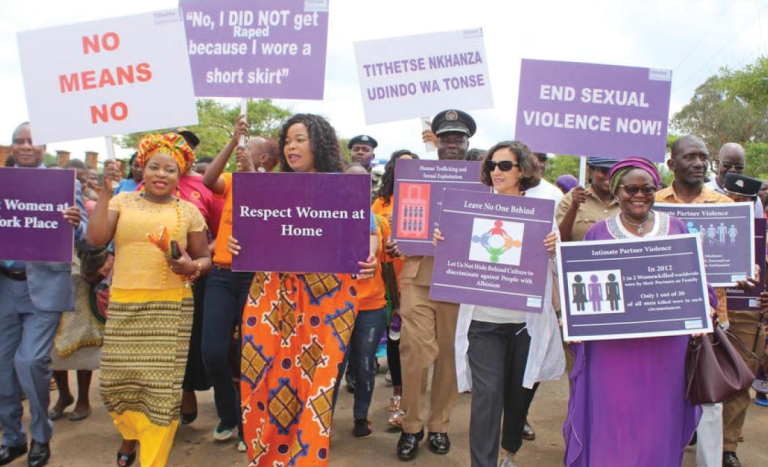‘Dad sleeps with me’
Courts in Malawi now mete out stiff sentences to child sexual abusers, but freelance journalist JOSEPHINE CHINELE highlights the obstructions survivors of these taboo cases face to access justice:
A woman disguised as Chiyanjano was shocked when she learned that her husband had been sleeping with her nine-year-old daughter for a year as the girl’s siblings looked on.

“Nothing unusual happened on the day my daughter told me: ‘Dad has been sleeping with me.’ She was just terrified because on the day, I was away and he had forced himself onto her. She was in pain,” recalls the mother. “The child pleaded with me to keep this a secret as her step father had threatened to kill her if she told me or any other person.”
Chiyanjano, however, did not confront him immediately to avoid alerting him to escape, but staged an excuse to visit her sister with the children.
The husband’s arrest angered her in-laws who faulted her for reporting to the police instead of ankhoswe.
“I was shocked to hear this from people I trusted. Since then, they hate me so much. But I couldn’t relent. This criminal case is beyond marriage counsellors, ” she says.
Double trauma
After her husband’s arrest, Chiyanjano feared returning home, terrified that the angry in-laws would attack her or the children.
“From all fronts, in-laws looted our homestead, taking things which ‘their brother bought’. They irritably called, forcing me to remove my stuff from their brothers’ house he inherited from his deceased parents. They said they wanted to rent it out to solicit money for his lawyer,” she says.
Chiyanjano soon found herself homeless as the in-laws continued calling her wicked and excluded her from all family groups.
During the interview, Chiyanjano stated that she enjoyed a happy marriage with her husband and that she felt betrayed when the girl revealed her ordeal.
“At one of the court sessions, I asked why he did this. He didn’t say much, he just asked for my forgiveness, saying the devil tempted him,” she said.
The man is serving a 21-year jail term after being found guilty of defilement.
‘We don’t safe’
However, from prison, which is supposed to be cut away from the outside world, the husband still calls her using different phone numbers.
“He started doing this when he was on remand, forcing me to drop the charges. I feel we are not safe, he can do anything to us while he is still serving. I wish authorities could do something about it,” she explains.
The police spoke of deep-rooted harassment of complainants who reported sexual abuse involving close relations.
“Having sexual activities with a child is a serious crime. Surprisingly, we receive lots of demands to have cases discontinued due to family pressure on the survivors,” says national police spokesperson Peter Kalaya.
These issues occur nationwide, he states.
He adds: “Most sexual crimes involving close relatives are reported by neighbours or other concerned community members, not relatives,” says the police publicist. “Women mostly conceal sexual abuse because the perpetrators tend to be breadwinners.”
However, this tendency has grave consequences on the victims who grow up with trauma and get exposed to sexually transmitted diseases, including HIV.
Women’s Legal Resource Centre executive director Maggie Kathewera-Banda says people who conceal such crimes are accomplices and should also be prosecuted.
“People who have committed a crime should not be allowed to remain in society. They are undesirable elements that should not remain amidst people,” she states.
She says it is time Malawians learned to condemn evil and reward good.
“The public needs to participate in preventing crime. It’s disheartening to see people siding with a perpetrator against a survivor of sexual violence. We need to work together to curb this vice,” says the campaigner.
Reporting gaps
Chiyanjano is only happy that justice was finally served.
She urges authorities to make sexual abuse reporting less frustrating.
“When I reported the crime at a police station, they refused to use a medical report from a private hospital and sent us to a congested public health facility where I met a clinician who was reluctant to assist us. We were assisted 12 hours later by health workers on the next shift. This would easily discourage people from reporting sexual abuse,” she says.
To enhance efficiency and confidentiality, all major public health facilities have one-stop centres uniting the police, social workers and health workers.
“We don’t accept medical reports from private facilities because there it’s easy to tamper with results, which are tendered as evidence in court,” he insists.
Kalaya commends activists for increasing awareness and encouraging Malawians to open up and report sexual abuse.
As Chiyanjano is rebuilding her life and that of her daughters, she urges authorities to establish a special fund in support of women who continue to live with perpetrators because they have no financial support.
“Women are harbouring abusers for the sake of their financial well-being. I know I’m hated for this, but it gives me peace that I have protected a dozen would-be victims of my husband.”
Chiyanjano and her children have attended several sessions of counselling, but fear reprisals her jailed husband can mastermind behind the bars.





